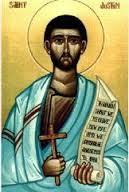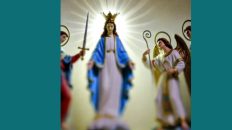“When it comes to St. Justin, the obvious needs to be affirmed that names have serious effects on an individual, and that I have seen in you. Thanks for bringing the undiluted faith to our doorsteps by imitating your patron saint Justin who defended and taught the faith of the Church with his whole life, and consequently suffering martyrdom. Happy feast day, padre”.
This was one of the beautiful messages I received privately this morning (being the memorial of Saint Justin, the martyr and apologist), from a member of our online WhatsApp Catholic Community Forum. The message came to me as an encouragement to put in more efforts in my apologetic works, bearing in mind the theme I chose at my Priestly Ordination: “For this, I was born, to bear witness to the Truth…” (Jn. 18:37). Just as saint Justin bore witness and defended the undiluted Truth, here also I’m to do the same.
While some might be wondering who Saint Justin was and his contributions to the life of the early Church, I hereby present you all with a brief biography of this great and erudite saint. Who is this Justin? What do we know about him?
The name Justin springs from the Latin name, which was derived from JUSTUS. Justin is an anglicized form of the Latin given name Iustinus (Justinus), a derivative of Justus; meaning Just; upright; righteous. Justin is known as one of the most important of the Greek philosophers and apologists in the early Christian Church. The word “apologist” stems from the Greek word “apologia” (ἀπολογία), meaning “to speak in return”, “defend oneself” etc. It was a formal defence, either in response to prosecution in a court of law or by extension as a literary mode. This word was imported into the Christian parlance and its meaning becomes obvious: “A person who argues in defence or justification of his Christian faith”. This we see in the likes of St. Paul, St. Peter, etc. Even in his first letter, Peter urged us “Be ready at all times to answer anyone who asks you to explain the hop you have in you, but do this in gentleness and respect” (cf. 1Pet. 3:15)
Justin was born around 100 AD in Flavia Neapolis, Palestine. His parents were pagans and of Greek origin. They were wealthy and able to provide him with a first-class education. This thirst for knowledge led him to apply himself to the study of philosophy. He studied all varieties of pagan wisdom – Stoicism, Pythagoreanism, and Platonism – until his conversion to Christianity about the year 130 AD. He describes his conversion in his famous book, “Dialogue” with Trypho: Justin was walking by the sea near the town of Caesarea, when he met an old man who revealed the riches of the true Faith to him. The man told Justin about Jesus and the Hebrew Prophets, and encouraged him to pray so that he would be able to understand the truth about God. Convinced of this as the one true Faith, he was baptized and began teaching and writing about Christianity. St. Justin laid out one of the earliest descriptions of the Mass in his First Apology, written between 153 and 155 A.D. It’s great, because it offers a simplified version of Catholic theology intended for those who had no idea what a “bishop” was, or even what “Amen” meant. It’s like stumbling upon a children’s Sunday school class from the 2nd century.
His writings represent the first positive encounter of Christian revelation with Greek philosophy and laid the basis for theology of history. Justin’s first work seems to have been his Treatise Against all Heresies (now lost)… Justin explained to the pagans why they should not worship idols and revealed to them the mysteries of the true Faith. He travelled to other lands to debate publicly. He also wrote two open letters, The First Apology and The Second Apology, to the emperor Antonius Pius and his son, Marcus Aurelius, the philosopher. In these long, written arguments known as apologies, Justin explained and defended the Faith. Justin’s essay begins with the demand to investigate accusations and explains what Christians believe and do. Consequently, for defending the Christian faith with strong zeal, Justin and five others were beheaded around the year 165 AD, thus dying honourably for Christ as a martyr.
Today, St. Justin the martyr and apologist is the patron of Christian philosophers, apologists, and lecturers. I join the Holy Mother Church in celebrating this great saint of the early Church. I’m also grateful to God for inspiring my lovely parents who chose the name Justin for me at infant baptism. I have come to understand how strong and effective a name could be, especially if the individual cooperates with the grace that comes with the name.
May St. Justin always be the inspiration behind those who bear the name “Justin” and also to all lovers and apologists of the Christian faith. Amen
Shalom!
HAPPY FEAST DAY TO ME & ALL JUSTINs & JUSTINAs etc.




